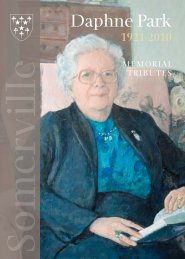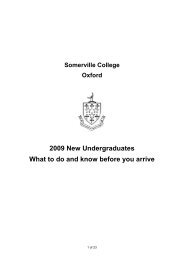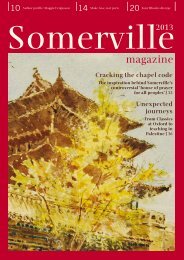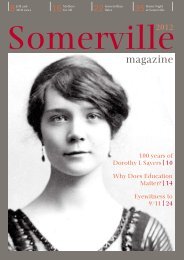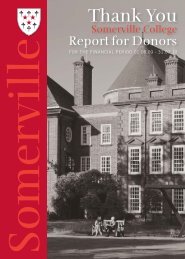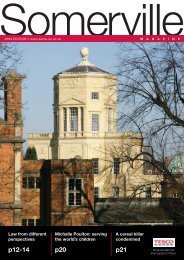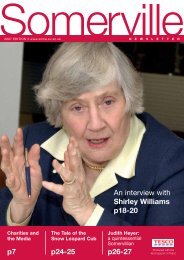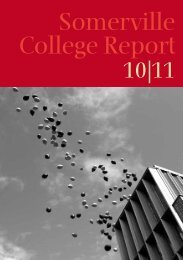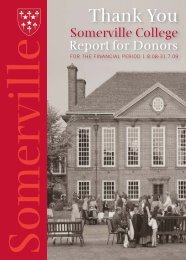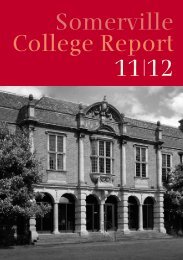magazine - Somerville College - University of Oxford
magazine - Somerville College - University of Oxford
magazine - Somerville College - University of Oxford
Create successful ePaper yourself
Turn your PDF publications into a flip-book with our unique Google optimized e-Paper software.
30 | <strong>Somerville</strong> Magzine<br />
later, when the Divisions were set up, that the colleges<br />
had collectively to nominate a representative to each<br />
new divisional board. Dame Fiona was the candidate<br />
<strong>of</strong> choice as representative to Medical Sciences, an<br />
excellent outcome. Wearing my college hat, I could see<br />
that she understood and would defend the interests <strong>of</strong><br />
colleges, and looking from the Medical School, it was<br />
equally clear that she understood the requirements <strong>of</strong><br />
education for the pr<strong>of</strong>ession.<br />
In no time at all, the division sought to make best use<br />
<strong>of</strong> Dame Fiona’s knowledge and expertise by asking<br />
her to take on the chairmanship <strong>of</strong> its Education<br />
Committee. This followed immediately on a period <strong>of</strong><br />
massive expansion in the intake to the conventional<br />
medical course, and the new ‘fast-track’ course by<br />
which graduates could qualify as doctors was being<br />
introduced. At the time, I was Director <strong>of</strong> Pre-clinical<br />
Studies for the Medical School, and I could not have<br />
hoped for a better source <strong>of</strong> support and political<br />
wisdom. She was always open to new ideas in<br />
education, she expected them to be properly backedup<br />
with argument and documentation, and she always<br />
kept a close eye on what change might mean for the<br />
students and the staff as individuals.<br />
I could not have hoped for a better<br />
source <strong>of</strong> support and political wisdom<br />
The creation <strong>of</strong> the Divisions in 2000 brought also the<br />
establishment <strong>of</strong> a new senior committee, with a wide<br />
remit referring to the employment and development<br />
<strong>of</strong> all university staff, the Personnel Committee. Dame<br />
Fiona was asked to chair it. The Personnel Committee<br />
rapidly began to play an increasingly central role in the<br />
<strong>University</strong>’s planning and management, a change which<br />
was acknowledged in 2005, when Dame Fiona was<br />
made Pro-Vice Chancellor for Personnel.<br />
Dame Fiona had a considerable command <strong>of</strong> personnel<br />
issues from her time in the Health Service, and her<br />
experience at <strong>Somerville</strong> and in the Medical Division.<br />
She was excellently placed then to lead the ‘Task<br />
Force on Academic Employment’, a review body that<br />
has examined academic employment in the collegiate<br />
university with great care over a period <strong>of</strong> fi ve years.<br />
This is an area <strong>of</strong> some sensitivity: it can only be said<br />
that Dame Fiona’s considerable judgment and skill<br />
have been essential in charting a passage through<br />
deep and sometimes turbulent waters. Her approach,<br />
characterised by patient, consultative working aimed at<br />
fi nding consensus has earned her widespread respect.<br />
The proper care <strong>of</strong> research staff, who are <strong>of</strong>ten<br />
employed on relatively short contracts, has been<br />
another major concern for Dame Fiona in her role<br />
as Pro-Vice Chancellor. Under her guidance, a new<br />
Code <strong>of</strong> Practice was developed last year and is now<br />
being introduced. Equally, our non-academic staff<br />
have received her attention: the <strong>University</strong> depends<br />
heavily on its administrative and support staff, its<br />
librarians, technicians and IT staff, its fi nancial<br />
experts and lawyers, its maintenance and estates<br />
staff, its secretaries, and so on. Dame Fiona and the<br />
Personnel Committee have overseen the introduction<br />
<strong>of</strong> new pay and grading scales, and the creation<br />
and implementation <strong>of</strong> the <strong>University</strong>’s fi rst Human<br />
Resources Policy.<br />
Increasingly, she has focused on promoting equality<br />
and diversity in all areas, a development in her role<br />
that was recognised in 2008 by renaming her portfolio<br />
(she became Pro-Vice Chancellor for Personnel and<br />
Equality). In this context, she has been a strong<br />
supporter <strong>of</strong> the consideration <strong>of</strong> gender issues and<br />
an enthusiastic promoter <strong>of</strong> training programmes<br />
aimed at helping women to develop the confi dence<br />
to move to positions <strong>of</strong> greater responsibility. I have<br />
seen all this at fi rst hand since standing down from<br />
my position in the pre-clinical school and joining the<br />
Personnel Committee fi rst as Proctor and then as<br />
Director <strong>of</strong> the Learning Institute.<br />
As I write, we have come to Dame Fiona’s fi nal year<br />
as Principal <strong>of</strong> <strong>Somerville</strong>. In Michalemas Term,<br />
2009, she chaired her last meeting <strong>of</strong> the Personnel<br />
Committee having resigned as Pro-Vice Chancellor<br />
in order to take on the chairmanship <strong>of</strong> the <strong>Oxford</strong><br />
Radcliffe Hospitals Trust. The word ‘retirement’ does<br />
not fi gure anywhere, and, as she moves on, the<br />
<strong>University</strong>’s loss will be the hospitals’ gain.<br />
Her work for the <strong>University</strong> has been undertaken with<br />
sensitivity, a willingness to listen, and a keenness to<br />
understand the position that other people are taking –<br />
all these I see as manifestations <strong>of</strong> the humanity that<br />
she has brought to her work. It is clear that she has<br />
given the <strong>University</strong> exceptional service through her<br />
energy and hard work, through her wisdom and clarity<br />
<strong>of</strong> thought and her sense <strong>of</strong> purpose, but I think that,<br />
above all it is this humanity which has been the key.<br />
And for all this, the <strong>University</strong> is greatly in her debt.<br />
Joanna Innes this year completes her 28th year as<br />
a history tutor in the <strong>College</strong>: Dame Fiona has been<br />
Principal during half her years at <strong>Somerville</strong>. Joanna is<br />
currently serving as Vice Principal, and working closely<br />
with the Principal in that role. Dr Stephen Goss is<br />
Director <strong>of</strong> the <strong>Oxford</strong> Learning Institute.



